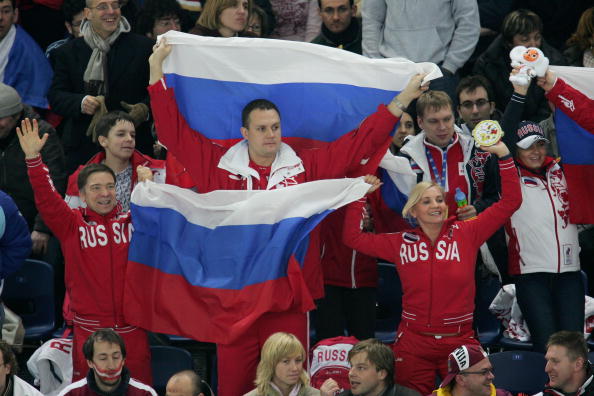Over the last couple months, Russia’s status for the 2016 Olympics has been threatened by revelations revolving around Russian Olympic athletes and performance enhancing drug use.
In May, Yuliya Stepanov, a runner, and Vitaly Stepanov, who collected blood and urine samples, were on 60 Minutes to talk about as many as four gold medal winners from Russia in the 2014 Winter Olympics in Sochi who were on steroids.
Just last week, reports came out the World Anti-Doping Agency (WADA) knew of the Russian’s doping ring during the 2012 Summer Olympics in London, but did nothing.
This all led to the Russian track team being banned from participating in the 2016 Summer Olympics in Rio de Janeiro.
“This is great for all sport and anybody who wants a real step forward in clean competition,” Former NBC Sports Chairman Dick Ebersol said. “The I.A.A.F. was strong and clear and direct in interpreting longtime rules.”
The track team’s banishment from the games then began to snowball. As the country went under a bigger microscope, news outlets began to report it was possible for all Russian athletes to be banned from the 2016 games.
“If the allegations are true, we will respond thoroughly and effectively,” WADA President Sir Craig Reedie said. Reedie then added a complete plan would be, “the nuclear option … but not impossible.”
Today’s T.J. Quinn, one of ESPN’s best investigative reporters, reported in a long string of tweets that, despite all the madness surrounding Russia’s multiple doping scandals, there’s still a chance for them to compete during the upcoming Olympic games in Rio. Beware, there were a lot of tweets:
While Putin threatens to keep entire country home, IOC says track athletes who pass special testing will compete under Russian flag.
— T.J. Quinn (@TJQuinnESPN) June 21, 2016
Russian President Vladimir Putin has fought back against these claims as well.
“I hope that we find some solution here, but that certainly doesn’t mean we will become insulted and say we won’t fight against doping. It’s the other way around, we will strengthen the fight against doping,” Putin said.
IAAF made strong statement last week but then said door slightly cracked for Rus athletes to compete if they trained/lived outside Russia. 1
— T.J. Quinn (@TJQuinnESPN) June 21, 2016
The statement Quinn is referring to is when the International Association of Athletics Federations (IAAF) agreed suspending the Russians from the upcoming games was smart. However, as Quinn mentioned, the IAAF could leave the door open for a smaller Russian team.
“There won’t be many athletes who will get through the crack in that door. They have to demonstrate they are not tainted by the system in Russia,” Rune Andersen, the head of the IAAF task force said.
Skeptics (meaning anyone who follows this stuff) saw that as opening for IOC to appease Russia. 2
— T.J. Quinn (@TJQuinnESPN) June 21, 2016
So now IOC says it's testing athletes, as though years of previous doping wouldn't give advantage, and they might compete under Rus flag. 3
— T.J. Quinn (@TJQuinnESPN) June 21, 2016
In a few days we went from ban of Russian athletics to what seems to be a way for smaller Russian team to compete under its own flag. 4
— T.J. Quinn (@TJQuinnESPN) June 21, 2016
So Putin will be able to say Russians were not banned, while IOC bans RUSAF administrators and says, there, we stood firm? 5
— T.J. Quinn (@TJQuinnESPN) June 21, 2016
If IOC applies IAAF's stated standard, that only Russian athletes who train/live in countries with credible anti-doping can compete (6)
— T.J. Quinn (@TJQuinnESPN) June 21, 2016
that's one thing. 3 or 4 athletes hardly a PR victory for Putin. But if IOC tries to apply Bach's previous goal of allowing athletes (7)
— T.J. Quinn (@TJQuinnESPN) June 21, 2016
who are "probably clean" to compete, then we're in wonderland. There. Is. No. Such. Thing. (8)
— T.J. Quinn (@TJQuinnESPN) June 21, 2016
After 18 years of this, the best the anti-doping world has to offer is hope that countries who follow letter and spirit of best practices (9
— T.J. Quinn (@TJQuinnESPN) June 21, 2016
can produce a crop of athletes who are probably cleaner than athletes from countries that don't. That's it. (10)
— T.J. Quinn (@TJQuinnESPN) June 21, 2016
So the idea that IOC can now test athletes six weeks out and prove they're clean makes a mockery of even that meager standard. (11)
— T.J. Quinn (@TJQuinnESPN) June 21, 2016
At some point, do they all just run into the streets of Lausanne and settle this with their armies?
— T.J. Quinn (@TJQuinnESPN) June 21, 2016
Let’s hope it doesn’t get to that. Lausanne, Switzerland, where the International Olympic Committee (IOC) is headquartered, is apparently gorgeous.
Of course right as Quinn wrapped up, this broke:
BREAKING: Russia's Olympic chief says Russia will not boycott Rio games – TASS news agency
— Reuters (@Reuters) June 21, 2016
The issue here is, there’s a big difference between Russia boycotting the games and the IOC just not letting them compete.







